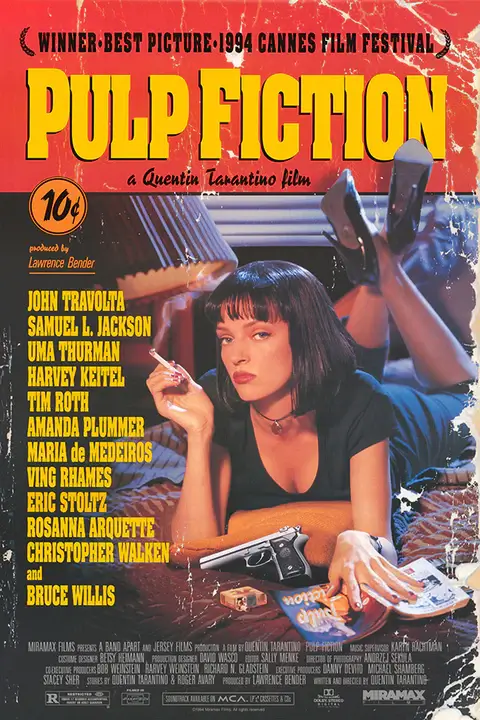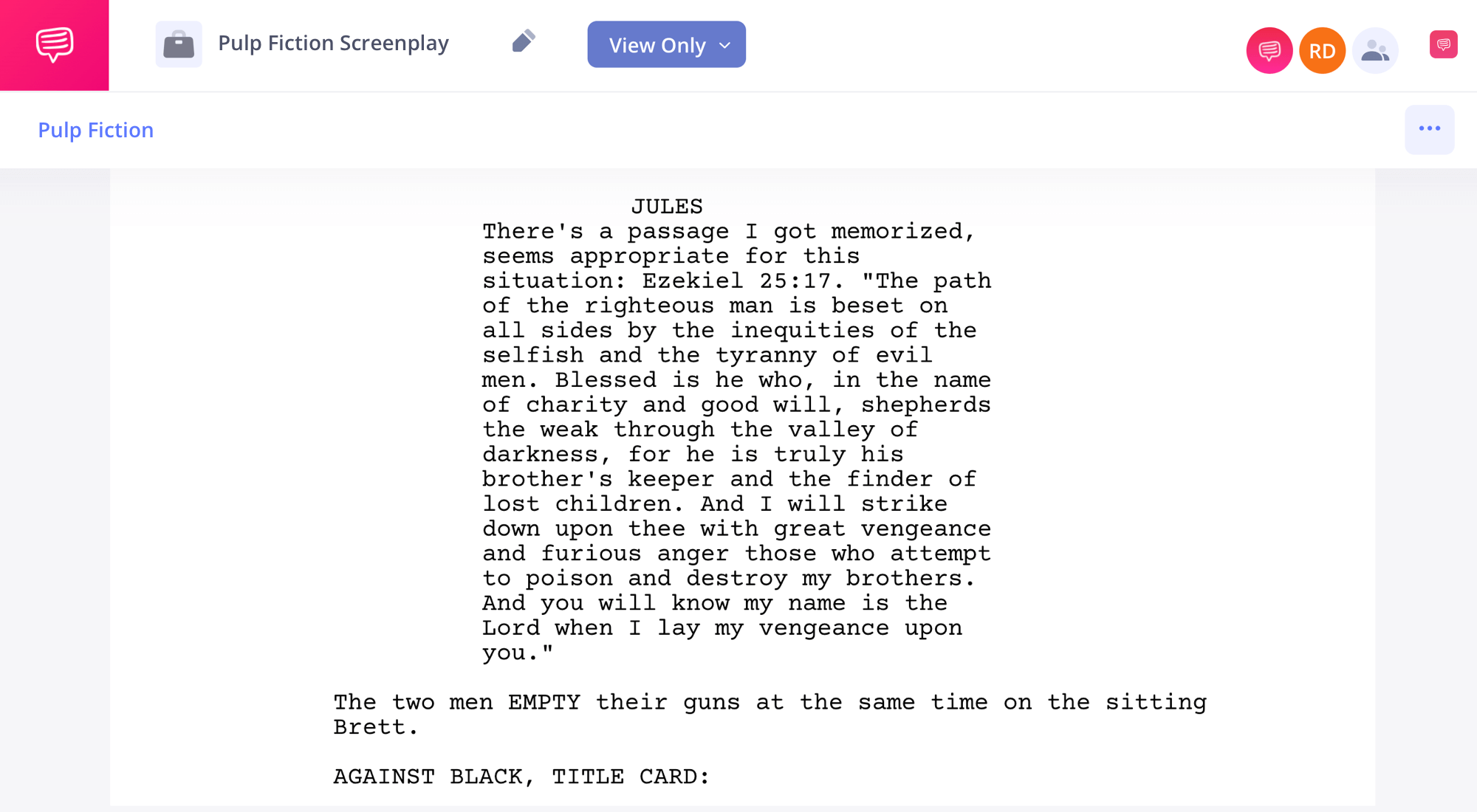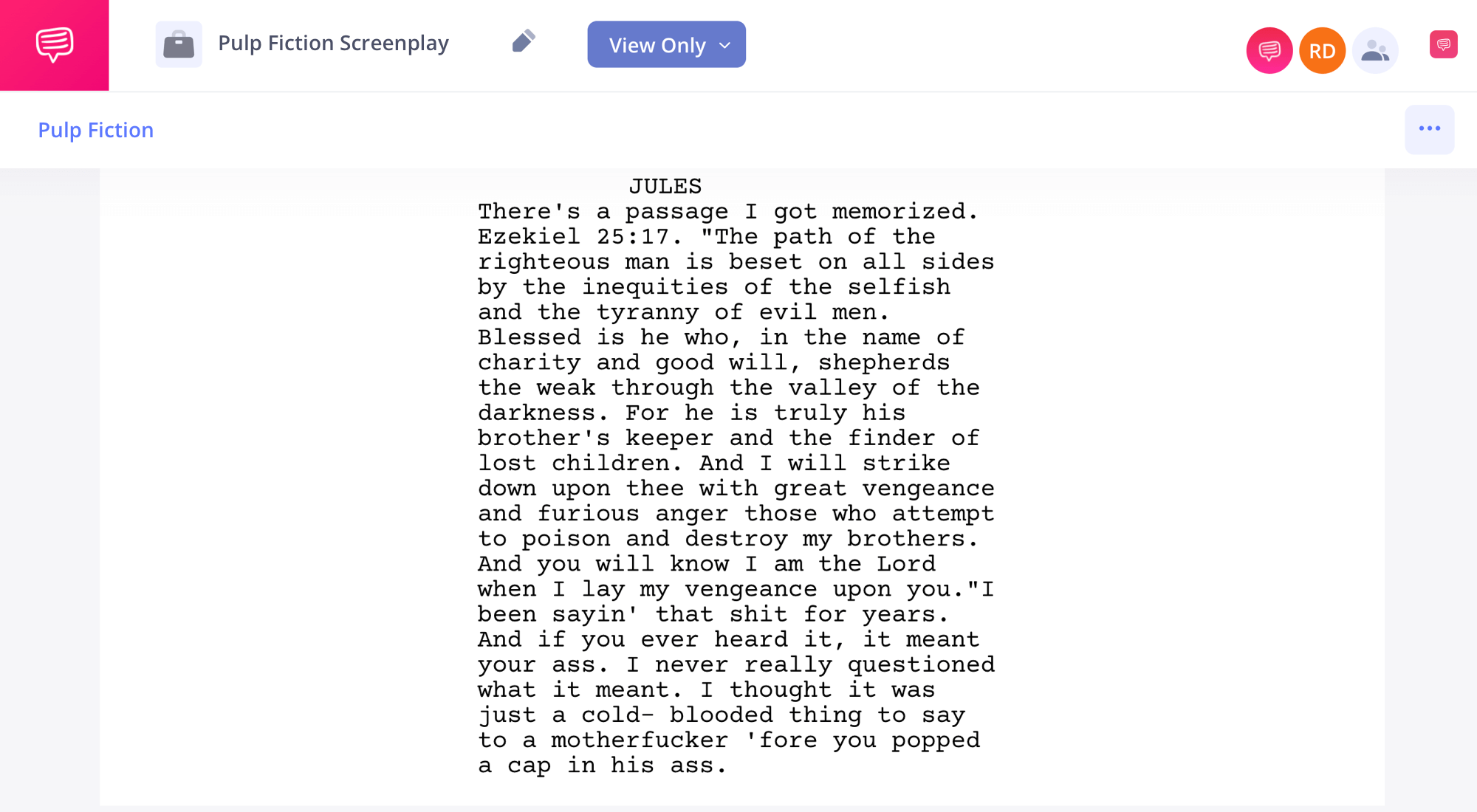Synopsis
What is Pulp Fiction about?
Logline
Set in L.A.'s criminal underworld, three interconnected stories intertwine the lives of a mob boss and his wife, two mob henchmen, a boxer and two small-time criminals.
Plot Summary
In the first story, mob henchman Vincent Vega is tasked with taking his boss's wife out for the night. Things go smoothly enough until she O.D.'s and Vincent must save her life or lose his.
In the second story, a boxer named Butch is paid to throw his next fight. After he betrays that agreement, and before he can escape L.A., his detour to recover his father's gold watch leads to kidnapping and torture.
In the final story, Vincent and Jules must deal with the clean-up of an accidental shooting in their car. Then, trying to enjoy a simple diner breakfast, they must contend with two small-time criminals trying to rob the restaurant.
Key Facts
- Director: Quentin Tarantino
- Screenplay by: Quentin Tarantino
- Stories by: Quentin Tarantino & Roger Avary
Trivia
- Honey Bunny was named after an actual rabbit belonging to Linda Chen, who typed up Tarantino's handwritten script for this movie. She asked Tarantino to watch her rabbit when she went on-location. Tarantino wouldn't do it, and when the rabbit later died, he named Amanda Plummer's character after Chen's pet.
- Vincent talks about Amsterdam because Quentin Tarantino spent time there writing the script for this movie. Tarantino purchased a school notebook to write the script, thinking one would be enough, but he wound up filling several of them.
- This movie and The Shawshank Redemption (1994) opened on the same date, October 14, 1994. Both were nominated for seven Academy Awards, with this movie winning for Best Original Screenplay. Both movies gained cult status in the following years, and are listed in the top ten in IMDb's top 250 movies.
Similar Films
Movies Like Pulp Fiction
Recommendations
If you like Pulp Fiction, here are some other films we would recommend that you might also like.
Other Tarantino Movies
Because his style is so singular, your next stop could easily be any one of Tarantino's other films. Go back to his first (Reservoir Dogs) to see where it all began, or behold a more mature Tarantino with his more recent Once Upon a Time in Hollywood.
Martin Scorsese Movies
If you responded to the gangster violence in Pulp Fiction, you'd do well to check out some of Martin Scorsese's best movies like Mean Streets, Taxi Driver, Goodfellas, Casino, and The Irishman.
Brian De Palma Movies
De Palma was a big inspiration for Tarantino, especially classics like Blow Out, The Untouchables, and Carlito's Way.
Characters
Pulp Fiction Characters
John Travolta plays Vincent Vega, one of Marcellus Wallace's top henchman. He drives a Chevy Malibu, has a manageable heroin habit, and reads books like Modesty Blaise by Peter O'Donnell.
Samuel L. Jackson plays Jules Winnfield, another one of Marcellus's henchmen. He doesn't eat pork, has an unshakeable spiritual core, and spouts Bible passages before executing someone just because it's cool.
Uma Thurman plays Mia Wallace, wife of mob boss Marcellus Wallace. She's a former actress, loves to dance, and enjoys the occasional uncomfortable silence.
Ving Rhames plays Marcellus Wallace, a mob boss with zero tolerance for betrayal. He stays cool under pressure, speaks the cold, hard truth, and is sometimes seen walking the streets of L.A. carrying a pink box full of donuts.
Bruce Willis plays Butch Coolidge, a boxer nearing the end of his career. He had endless courage, whether he's risking his life to betray the mob or walking into certain death to retrieve his father's watch.
Quotes
Pulp Fiction Quotes
Butch: Zed's dead, baby. Zed's dead.
Vincent: You know what they call a Quarter Pounder with Cheese in Paris?...A Royale with Cheese.
Jules: We should have shotguns for this kind of deal.
Mia: I do believe Marcellus Wallace, my husband, your boss, told you to take me out and do whatever I wanted. Now, I want to dance. I want to win. I want that trophy.
The Wolf: That's thirty minutes away. I'll be there in ten.
FAQ
Frequently asked questions about Pulp Fiction
The contents of the briefcase has never been officially revealed. There are countless theories out there, everything from the diamonds stolen in his previous film Reservoir Dogs to Marcellus's soul.
Pulp Fiction was filmed in and around Los Angeles. The exterior Jack Rabbit Slims was built in Glendale, while the interior was built on a soundstage. The diner from the beginning and ending of the movie was shot in Hawthorne. Butch's apartment was located in North Hollywood, and the boxing match arena/alley is in Pasadena.
Quentin Tarantino and Roger Avary are credited as writing the stories in the film. Tarantino alone is credited with the screenplay, for which he won an Academy Award.
Scene Excerpt
The Pulp Fiction Bible Verse Scene
In one of the most memorable scenes in the film, as well as from the entire decade, the Pulp Fiction Bible verse scene is an incredible piece of writing. As Jules himself later declares, we might just assume the Bible quote is simply "a coldblooded thing to say." And that may be true but it also sets Jules up for a spiritual reckoning later in the film.
Read the scene below and pay attention the rhythm and musicality of Tarantino's dialogue.
ENDING
How was the Pulp Fiction
ending written?
The Pulp Fiction ending is a bit unconventional because the scene we end on takes place somewhere in the middle of the story. Jules and Vincent are enjoying their breakfast in an L.A. diner when they are interrupted by some two-bit criminals.
Perhaps the most interesting takeaway from Pulp Fiction's ending is that even though it is out of order chronologically, it does give Jules a fitting climax to his character arc. Having survived what he deems a miraculous encounter, he has decided to become a better man. As he explains this to Pumpkin, we still get a sense of closure in the film, and instead of a bloody shootout that we all anticipated, the climax is character-based.
Below you can read this final conversation between Jules and Pumpkin. Take note on how this scene is such a great example of how to pull everything together for a character (Jules) and how he externalizes the internal change he's undergoing.
Learn More
Browse related articles
If you're interested in Pulp Fiction, check out these related articles.


